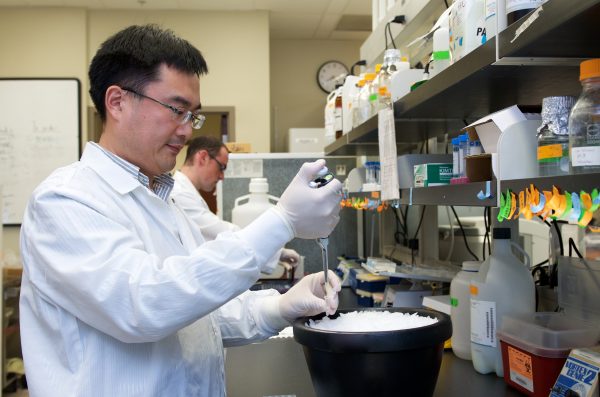Researcher Uncovers Clues to Cancer, Neurodegenerative Disorders

Frogs and their tiny eggs are helping a UNC Charlotte researcher unlock the mysteries of genomic instability, with implications for cancer and neurodegenerative disorders such as Alzheimer’s and Parkinson’s Disease.
Biological sciences assistant professor Shan Yan researches DNA damage that human cells sustain from thousands of internal and environmental assaults each day. Researchers know that the body’s cells have a complex set of processes that constantly assess the damage and make repairs to fragile genetic material.
Yet, the vital biochemical processes by which this constant DNA repair takes place are still only partially understood because of their complexity, speed, and the difficulty of studying complex interactions within living cells. Moreover, it remains unknown how cells sense the oxidatively damaged DNA in the first place.
“The main question we try to answer is how genomic integrity is maintained,” Yan says. “All living organisms have a genome, which must maintain its integrity in response to damaging agents, such as oxidative stress or chemotherapy drugs. The process is not well studied and there are many unanswered questions, which is why we are interested.”
For organisms to maintain their integrity, an elaborate network called DNA damage response detects abnormal DNA structures through a process called checkpoint signaling and coordinates the repair and activation. This DNA damage response has been demonstrated as a biological barrier to the formation of tumors.
In an article published in the Proceedings of the National Academy of Sciences (PNAS) in 2013, Yan’s lab first announced the discovery of a previously unknown surveillance mechanism.
Two biochemical pathways, known as ATM-Chk2 and ATR-Chk1, govern the cell’s response and repair of double-strand DNA breaks and other types of DNA damage or replication stress respectively. The molecular mechanisms underlying the ATR-Chk1 checkpoint activation include the uncoupling of DNA helicase and polymerase activities and DNA end resection of double-strand breaks.
The UNC Charlotte researchers found a third, previously unknown trigger for ATR-Chk1 checkpoint pathway, and this novel mechanism was discovered in the context of oxidative stress.
A base excision repair protein known as APE2 plays unexpected roles in the checkpoint response: single-strand DNA generation and Chk1 association. The protein was previously known to be involved in the DNA repair of oxidative damage, but not to the extent revealed in the study’s findings.
“Better understanding of these processes can give us new clues or avenues for therapies for human diseases,” Yan says. “We have discovered that many of the target proteins we’re working with in Xenopus are correlated with those found in cancer patients.”
Yan’s research is funded in part by the National Institutes of Health’s National Institute of General Medical Sciences (NIGMS). The funding (NIH R15GM101571) has allowed Yan to support his lab, train students, and publish eight papers in a three-year period, often with students.
The most recent research papers were published in Biochemical and Biophysical Research Communications and Cellular Signalling. Yan also summarized the current understanding of oxidative stress response and discussed applications of these findings from basic research to cancer and neurodegenerative diseases in two comprehensive review articles in Cellular and Molecular Life Sciences and International Journal of Molecular Sciences.
In March 2015, the NIH awarded him additional funding of over $360,000 (NIH R15 GM114713). He also has received funding from UNC Charlotte.
“The whole research program is growing, and we are grateful for the funding support,” Yan says. “This is a very encouraging and emerging area, and our cutting-edge research projects will help to better understand genome stability and cancer development.”
Yan works closely with students and fellows, including postdoctoral fellows and graduate, undergraduate and high school students.
“We’re passionate about this line of research because we want to know how it works at the core,” says Steven Cupello, who is pursuing a doctoral degree in biology. “We don’t just get to uncover that DNA repair happens, but also try to unravel the nuanced mystery of exactly how it happens.”
Another student who works with Yan, Jude Raj, was chosen for a 10-week intensive Research Experience for Undergraduates (REU) program funded by the National Science Foundation. This Biology and Biotechnology REU program allowed him to develop lab research skills, continue independent projects, and present the results at various research symposiums.
“After successful months of training, Dr. Yan offered me the incredible opportunity to pursue an independent project,” says Raj, a biology honors student. “I’ve become deeply passionate about molecular biology and fascinated about the invisible, microscopic reactions taking place in living organisms.”
Raj has gained insights not only into the subject but also into research practices. His research presentation was awarded first place in Biological Sciences at the University’s Undergraduate Research Conference in April.
“I think the biggest life lesson I have learned from my research experience is to never quit and keep moving forward, no matter how much you fail,” he says. “Research has had such a great impact on me by increasing my problem-solving skills, and even making my classes more interesting. My ultimate dream would be working alongside other scientists to eradicate disease.”
Yan’s students have created a video and a written resource for the Journal of Visualized Experiments, describing how the lab use Xenopus egg extracts to study pathways of DNA damage response. Yan’s lab also shares its research by giving tours of the lab during the UNC Charlotte Science and Technology Expo each spring.
To expand access among a larger group of students beyond his lab, Yan integrates his research in the classroom. By sharing real-world examples of cell biology research outside the textbook, he hopes to inspire his students.
“Science is always the driving force for the overall human being,” he says. “It’s not always easy to move forward, but every new discovery through basic research could open unidentified and unexpected new avenues.”
Words: Tyler Harris | Image: Lynn Roberson, showing Biological Sciences researcher Shan Yan and master’s degree student Stephen Cupello in Yan’s lab.